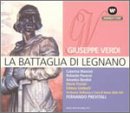| All Artists: Giuseppe Verdi, Fernando Previtali, Rome RAI Orchestra, Albino Gaggi, Amedeo Berdini, Caterina Mancini, Edmea Limberti, Manfredi Ponz De Leon, Mario Frosini, Rolando Panerai Title: Verdi: La Battaglia di Legnano Members Wishing: 0 Total Copies: 0 Label: Fonit Release Date: 3/26/2002 Genre: Classical Style: Opera & Classical Vocal Number of Discs: 2 SwapaCD Credits: 2 UPC: 793515228426 |
Search - Giuseppe Verdi, Fernando Previtali, Rome RAI Orchestra :: Verdi: La Battaglia di Legnano
 | Giuseppe Verdi, Fernando Previtali, Rome RAI Orchestra Verdi: La Battaglia di Legnano Genre: Classical
|
Larger Image |
CD Details |
CD ReviewsHighly impressive singing in early Verdi opera L. E. Cantrell | Vancouver, British Columbia Canada | 05/20/2006 (5 out of 5 stars) "Source: Radiotelevisione Italiana Roma broadcast of March 1, 1951, subsequently issued on records by Cetra.
Sound: Fairly good 1950s mono. Solo voices are well caught and given prominence over the orchestra, as was typical of the era. Cast: Rolando, an official of Milan - Rolando Panerai; Lida, his wife - Caterina Mancini; Arrigo, Messenger of Verona and formerly betrothed to Lida - Amedeo Berdini; Federico Barbarossa, Holy Roman Emperor / Marcovaldo, a German prisoner - Mario Frosini; First Consul of Milan / Second Consul of Milan / Podesta of Como - Albino Gaggi; Imelda, Lida's maid - Edmea Limberti; Herald - Manfredi Ponz de Leon. Conductor: Fernando Previtali with the Orchestra Sinfonico and Coro di Roma della RAI. Format: Disk 1 - Act I, tracks 1-14; Act II, tracks 15-19; 53:59. Disk 2 - Act III, tracks 1-12; Act IV, tracks 13-15; 55:34. Documentation: Libretto in Italian. Short summary of the plot by Act. Track list that identifies principal singers and provides timings. Contemporary portraits of the youthful Verdi looking almost dandyish, librettist Salvatore Cammarano looking prosperous and Gaetano Fraschini, a favorite of Verdi and the first Arrigo, looking like a pompous ass. "La Battaglia di Legnano" premiered in January 1849. In Verdi's canon, it follows "Il corsaro" and precedes "Luisa Miller." By the time he wrote it, Verdi had probably accumulated all the skills that would very soon flash out in the wonder year that saw "Rigoletto," "Il trovatore" and "La traviata." He did not yet, however, have a libretto that would allow him to breathe life into his characters. "La Battaglia" is another rousing, patriotic flag-waver, characteristic of Verdi's self-described "years in the galley." There are booming choruses, powerful solos and spirited ensembles, but not a lot of insight. The plot is a bit of fluff played out against a piece of history in which Italians take pride. Believing Arrigo dead, Lida has married Rolando. Arrigo turns up very much alive (two or three years late, of course, but alive.) Arrigo discovers that Lida has married his former old pal Rolando. Being an Italian tenor, Arrigo--of course!--convinces himself that Lida has intentionally betrayed him, so he rushes off to do something stupid. In the background, the northern Italian cities that comprise the Lombard League, towns that had cheerfully double-crossed, raided, looted and burned each other for centuries, stand shoulder to shoulder against the foreign menace of the invading German emperor. They even manage to defeat him in battle--much to their own surprise, as well as that of anyone looking back on them. I acquired this recording because I am an unabashed fan of big-voiced Verdi soprano Caterina Mancini, because baritone Rolando Panerai is almost always a good bet and because I just plain enjoy the shaggy authenticity of the old Cetra opera series. What I did not expect from the set was Amedeo Berdini, a fine, strong tenor who was absolutely right for Verdi. What a find! I had never heard of him. (And it appears that the previous reviewer, The Green Scholar, felt very much the same surprise at Berdini, too.) Even now, I know no more than that Berdini was active in Italian opera houses in the years immediately following the war and that he seemed to specialize in the slightly offbeat: Italian productions of Mussorgski, Montemezzi and nearly forgotten Verdi. So far as I can see, he did not record any of the standard Italian tenor operas. And that is a shame, a dirty rotten shame! This is an enjoyable opera that boasts of three principal singers who were true Verdians, all under the control of Previtali, who kept up the pace and possessed Verdian authenticity in his bones. Five stars! Oh, yeah." |

 Track Listings (19) - Disc #1
Track Listings (19) - Disc #1